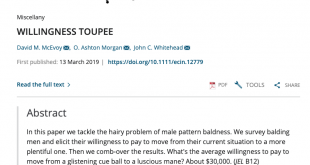Soon after joining the Budget Committee, Kelton the deficit owl played a game with the staffers. She would first ask if they would wave a magic wand that had the power to eliminate the national debt. They all said yes. Then Kelton would ask, “Suppose that wand had the power to rid the world of US Treasuries. Would you wave it?” This question—even though it was equivalent to asking to wipe out the national debt—“drew puzzled looks, furrowed brows, and pensive expressions....
Read More »Comment l’extrême droite a préparé l’insurrection au Capitole
Comment l’extrême droite a préparé l’insurrection au Capitole .[embedded content]
Read More »IPA’s weekly links
Guest post by Jeff Mosenkis of Innovations for Poverty Action. Samia Suluhu Hassan was sworn in as Tanzania’s first woman president, following the death of John Magufuli, known for his denial of COVID-19 in the country. Some speculate the virus was the cause of his death rather than the official announced cause, heart failure. A nice article from Dani Rodrik about how economists can get along with other fields. Known for their breadth and willing to take on many kinds of questions,...
Read More »The Nobel prize that isn’t really a Nobel prize
The Nobel prize that isn’t really a Nobel prize .[embedded content] And if you want to get that prize in economics — and want to be on the sure side — yours truly would suggest you move to Chicago. Out of the 86 laureates that have been awarded “The Sveriges Riksbank Prize in Economic Sciences in Memory of Alfred Nobel,” more than a third have been affiliated to The University of Chicago. The world is really a very small place when it comes to economics …...
Read More »Professor svarar lättkränkta Malmöstudenter
Professor svarar lättkränkta Malmöstudenter Min främsta uppgift är att förmedla kunskap, inte att skydda studenter från obehag. Samtidigt finns det ett pedagogiskt problem i det, för om studenterna upplever alltför stort obehag, kommer det att stå i vägen för deras och deras medstudenters lärande. Det gör min situation svårlösbar: Hur skall jag kunna undervisa om ett visuellt material utan att använda bilder? Hur skall vi lära oss att identifiera och...
Read More »Yours truly among top economics influencers to follow
Yours truly among top economics influencers to follow Mainstream economics has sadly made economics increasingly irrelevant to the understanding of the real world. Trying to contribute in making economics a more realist and relevant science, yours truly launched this blog in March 2011. Now, ten years later and with millions of page views on it, yours truly is — together with people like e.g. Paul Krugman, Nate Silver, Dani Rodrik, Thomas Piketty, Steve...
Read More »Chicago style history of economics
Chicago style history of economics Dans son histoire de la macroéconomie, De Vroey (2015) donne le premier rôle aux transformations épistémologiques et méthodologiques défendues par la NEC [nouvelle économie classique], et plus particulièrement par Robert Lucas. Les macroéconomistes aujourd’hui reconnaissent en général cette dimension principale de la NEC … Si les bouleversements qu’a connu la macroéconomie sous l’impulsion de la NEC dans les années 1970...
Read More »The stability problem in Sraffian economic
The stability problem in Sraffian economic There is little doubt that the structure of the Sraffian system is identical to GET [General Equilibrium Theory] in its commitment to the algebra of simultaneous equations but with this difference: the equations in GET are demand and supply equations, whereas the equations in Sraffian economics are physical input-output relations, which are supposed to determine prices independently of demand. The existence...
Read More »DSGE models — worse than useless
DSGE models — worse than useless Mainstream macroeconomics can only progress if it gets rid of the DSGE albatross around its neck. It is better to do it now than to wait for another 20 years because the question is not whether but when DSGE modeling will be discarded. DSGE modeling is a story of a death foretold … Getting rid of DSGE models is critical because the hegemonic DSGE program is crowding out alternative macro methodologies that do work … DSGE...
Read More »Neo-Ricardian economics — rigorous and totally irrelevant
Neo-Ricardian economics — rigorous and totally irrelevant I claim that Sraffian economics, however rigorous in its use of the simultaneous equations method … is irrelevant to our understanding of the real world and, judging by its failure to draw any policy implications, is largely irrelevant to the major concerns of modern economists … This is not a judgment based simply on my opinion, which is ultimately no better than yours. Relevance is not a matter for...
Read More » Heterodox
Heterodox








